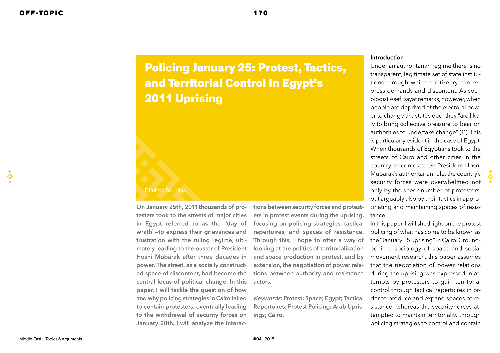Policing January 25: Protest, Tactics, and Territorial Control in Egypt's 2011 Uprising
On January 25th, 2011 thousands of protesters took to the streets of major cities in Egypt—referred to as the "day of wrath"—to express their grievances and frustration with the ruling regime, ultimately leading to the ouster of President Hosni Mubarak after three decades in power. The str...
Enregistré dans:
| Publié dans: | Middle East - Topics & Arguments |
|---|---|
| Auteur principal: | |
| Format: | Artikel (Zeitschrift) Daten |
| Langue: | anglais |
| Publié: |
Philipps-Universität Marburg
2015
|
| Sujets: | |
| Accès en ligne: | Accès en ligne Voir la notice |
| Tags: |
Ajouter un tag
Pas de tags, Soyez le premier à ajouter un tag!
|
| Résumé: | On January 25th, 2011 thousands of protesters took to the streets of major cities in Egypt—referred to as the "day of wrath"—to express their grievances and frustration with the ruling regime, ultimately leading to the ouster of President Hosni Mubarak after three decades in power. The street, as a socially constructed space of discontent, had become the central locus of political change. In this paper, I will tackle the question of how and why policing strategies in Cairo failed to contain protesters, eventually leading to the withdrawal of security forces on January 28th. I will analyze the interactions between security forces and protesters in protest events during the uprising, focusing on policing strategies, tactical repertoires, and spaces of resistance. Through this, I hope to offer a way of looking at the politics of territorialization and space production in protest, and by extension, the negotiation of power relations between authority and resistance actors. |
|---|---|
| DOI: | 10.17192/meta.2015.4.2669 |
 Publikationsserver
Publikationsserver